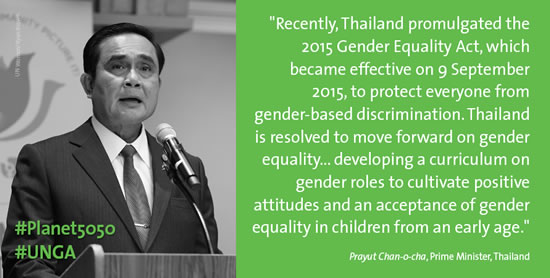Thailand promises education to cultivate acceptance of gender equality, data to monitor progress, training to promote gender-responsive budgeting (updated)

Thailand’s 2015 Gender Equality Act protects all individuals from gender-based discrimination. Thailand is resolved to move forward on gender equality by developing a curriculum on gender roles that cultivates positive attitudes and acceptance of gender equality in children from an early age.
It will collect sex-disaggregated data, for analytical purposes and for formulating gender-sensitive policies, as well as for monitoring progress made to achieve gender equality. In providing training to relevant national public agencies, it will promote gender-responsive budgeting.
Thailand’s next national and economic and social development plan will focus on people-centred, inclusive development and on reducing social inequality, providing further opportunities for women to participate even more equally in national development.
Speaking at the Global Leaders’ Meeting on 27 September 2015, Prime Minister Prayut Chan-o-cha said: “Promoting gender equality is not a matter that lies only in the hands of women. Men and boys must also do their part to foster positive attitudes on gender roles.” [ Speech ]
Developments since Thailand’s commitment
The Government of Thailand is taking several measures to enhance gender equality and women’s empowerment, most notably, by engendering school curricula, implementing gender-responsive budgeting and improving sex-disaggregated data collection.
The implementation plan for the gender equality curriculum has been established and the Ministry of Education is currently revising the curriculum.
Gender-responsive budgeting is now included in the 2016 Constitution and will be implemented at the national level.
Thailand has created a National Plan on gender statistics in order to collect gender data on poverty, education and training, health, violence, economy, decision-making and other pertinent areas. [ Full update ]